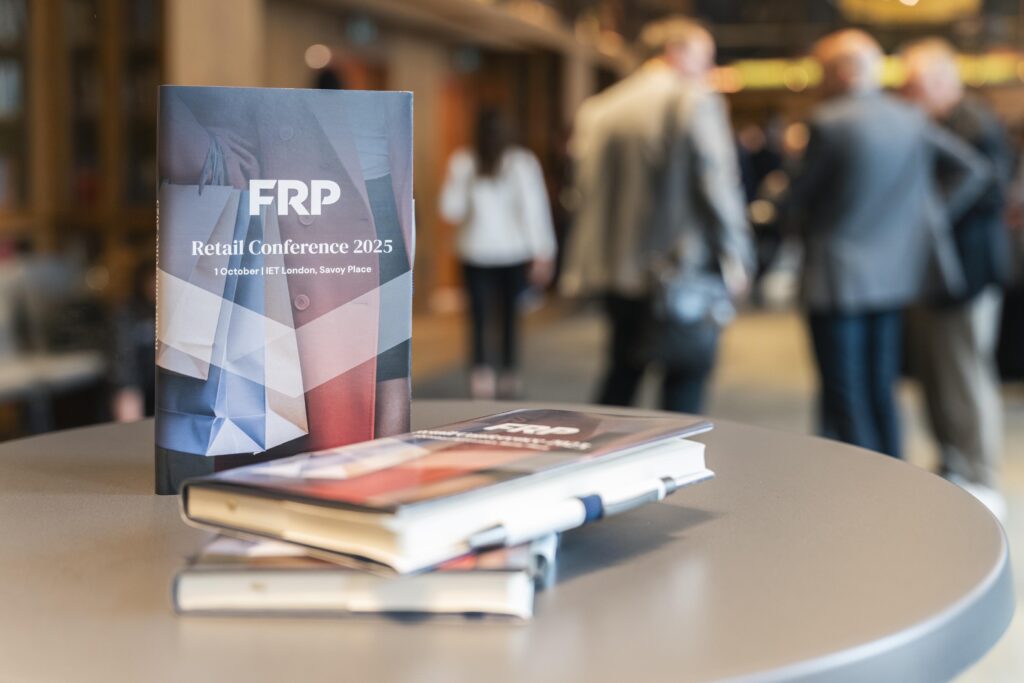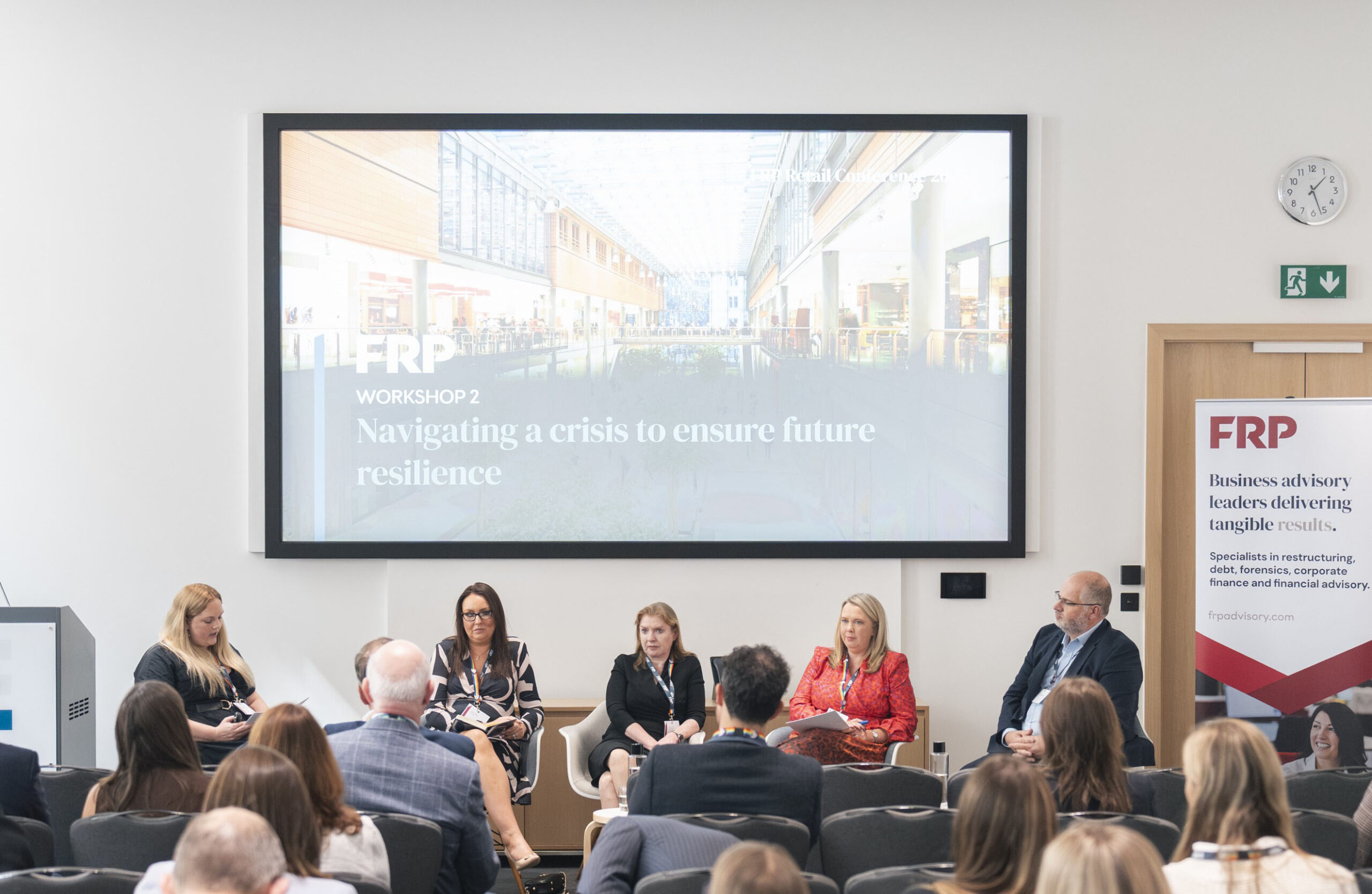Key takeaways from our workshops and panel discussions

FRP’s 2025 Retail Conference brought together influential voices across the sector to explore the challenges, opportunities, and future direction of retail. From navigating disruption with resilience to embracing the rise of social commerce and the influence of Gen Z; the day delivered a clear message, while retail remains under pressure, innovation, adaptability, and a consumer-first mindset are shaping a bold new reality.
Opening the discussion, FRP’s Restructuring Advisory Partner and Chair, Tony Wright, set the tone with a powerful reminder that while “challenge” may dominate the headlines, the word that truly defines the retail sector is “resilience.” As new business models and market entrants continue to reshape the landscape and consumer behaviour evolves at pace, signs of recovery are emerging.
Keynote speaker and one of the UK’s most respected consumer and retail experts, Kate Hardcastle MBE, explored how joy and memorability play a vital role in the sectors success, with fun experiences and personal touches helping to build lasting loyalty. Inclusion was another key theme she explored, as today’s shoppers expect brands to design for everyone, from adaptive fashion to diverse campaigns, tailoring your approach to your audience is key. She also highlighted the importance of blended journeys, where physical and digital experiences must work seamlessly together to meet evolving expectations.
A powerful message which emphasised the need for retailers to prioritise authentic, human-centred experiences to stand the test of time.

Explore the key takeaways from our panel discussions and workshops:
Workshop 1: ‘The Investment and lending landscape for retailers:’
- Muted M&A activity
M&A activity in retail has been subdued in volume over the last 12 months, primarily due to inflationary pressures, rising interest rates, and broader macroeconomic risks. While market sentiment is showing signs of recovery, this may be impacted by the upcoming Budget. - Valuations remain resilient
Strategic buyers are actively pursuing opportunities to unlock synergies, expand brand portfolios and access new distribution channels. - Strong lender appetite
Lender appetite is strong provided that robust due diligence is conducted, including asset valuations and exit scenarios. The debt market is evolving, with new entrants and private credit funds actively reshaping the landscape, demonstrating interest in retailers that may be overlooked by traditional high street banks. - Due diligence is evolving
Financial due diligence is taking longer due to a shift to value-driven assessments that prioritise future potential and business resilience. While AI can support this by analysing large datasets, identifying gaps and highlighting trends, it is not a substitute for trusted human advisers. - Preparing for a capital event
When preparing for a capital event retailers should ensure that there is sufficient liquidity and working capital, clearly articulate their value proposition, engage good advisers; and evaluate a full range of funding options.

Workshop 2: ‘Navigating a crisis to ensure future resilience’
- Preparation pays
Technical Director at MacTavish, Sarah Milner explained that understanding your insurance policies, knowing what’s covered, and stress-testing scenarios are critical steps in building resilience. Seeking expert advice early, before issues arise, can make all the difference in protecting your business when it matters most. - Document everything
Clear, consistent documentation is essential. Maintaining thorough records and evidence not only supports claims but also helps safeguard value during times of disruption or dispute. - Collaborate proactively
Building strong relationships with advisers, suppliers, and underwriters before a crisis hits ensures faster, more coordinated responses. Paul Stiff, Former Global Head of Ocado Group emphasised that a trusted network can be a strategic asset when navigating uncertainty. - Stay ahead of evolving risks
From cyber threats and data breaches to supply chain disruptions and regulatory shifts, risk profiles are constantly changing. Regularly reviewing and refreshing your risk strategy is key to staying protected and future-ready.
Ask the expert’s panel: ‘State of UK retail: From disruption to opportunity’
- Volatility is the new normal
Inconsistent footfall, rising costs, and investor demands make trading unpredictable. - Physical stores are back
High-street presence is becoming a powerful customer acquisition tool, balancing soaring online advertising costs. - A multichannel mix is critical
From online and wholesale to pop-ups and physical stores, retailers need multiple routes to market. - Returns and theft are rising
Costing billions, these issues demand fresh strategies - Landlord dynamics are shifting
Turnover leases and halo clauses show landlords are more open to partnerships.
Despite challenges, examples from Next, Primark and other players show that the right mix of cost control, focus, and innovation can drive success.

Workshop 3: ‘Agile business models for a changing retail landscape’
- Spot underperformance early
Timely intervention is crucial. Retailers should regularly review store performance, assess the impact of initiatives, and act quickly to address areas of concern before they escalate. - AI offers efficiency gains
Artificial intelligence is helping retailers forecast demand and streamline operations. While most remain in pilot phases, the potential for automation and data-driven decision-making is clear. - Omnichannel drives engagement
Seamless integration across physical and digital channels is proving most effective in building customer loyalty and enhancing the overall shopping experience. - Supply chain resilience is critical
Near-shoring and diversified sourcing strategies are helping retailers reduce risk and align with sustainability goals, especially in the face of global disruptions. - Employment regulation is tightening
New rules are expected to limit redundancy-driven cost savings, prompting retailers to explore alternative strategies for workforce management and operational efficiency.

Workshop 4: ‘Rethinking retail talent in a changing world’
- Gen Z influence is growing fast
Bridget Lea, Vice President & General Manager of Snap Inc stated that platforms like Snapchat are central to how 13-28-year-olds engage with brands. While they may not yet hold full spending power, their cultural influence is significant, and within five years, their economic impact will surge. Authenticity is non-negotiable for this generation; they expect brands to be real, value-driven, and socially aware. - Leadership must adapt beyond policy
Many of the forces reshaping retail, like tech adoption and generational change aren’t covered by government policy. Leaders must proactively evolve their strategies to stay ahead of these shifts. - Reskilling is on the rise
Bridget also expressed that sales advisers now need fluency across digital platforms. Some retailers are reimagining roles, placing employees in junior digital positions to build cross-functional knowledge and future-proof their teams. - Innovative hiring strategies are emerging
From fractional leadership models to recruiting talent from unexpected backgrounds (e.g., fitness professionals working in tech retail), businesses are thinking outside the box to build diverse, high-impact teams. - Culture is a competitive advantage
A strong, inclusive, and engaging culture helps businesses weather tough times and attract top talent. Leaders must be visible, listen actively, and use tools like employee surveys and social platforms to understand sentiment and spot early warning signs. - Succession planning is critical
Many employees leave due to unclear career paths. Leaders must be honest about opportunities, offer lateral moves when needed, and help junior staff craft meaningful careers. - External awareness is essential
Competitive intelligence is now at everyone’s fingertips. Retailers must stay informed about how competitors are delivering better experiences and use that insight to refine their own strategies. - Diversity drives performance
The best shortlists are diverse. Hiring should focus on competencies and potential, not just traditional experience. Boards must embrace diversity of thought to lead effectively in a changing market.

Expert panel: ‘The Future of Retail – what’s to come’
- Purpose matters
Panellists Maddie Smith, Beauty Retail Expert and Ian Shepherd, Chairman at Bensons for Beds both expressed that Retailers must be clear on why they exist beyond distribution. - Personalisation and loyalty
Data-led insights are vital to building lifetime value. - Social commerce and resale
Both are growing rapidly, especially among younger consumers. - Agility is essential
Short leases, flexible teams, and quick responses to market shifts will separate winners from losers. - Talent is decisive
Tomorrow’s leaders need to master people, operations, AI and data in equal measure.
Retail’s future success will be built on clarity, customer obsession, and the ability to adapt at pace.







